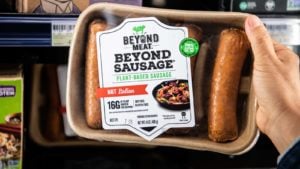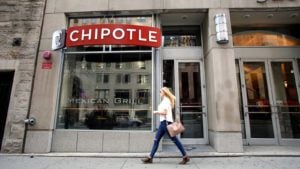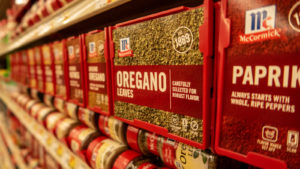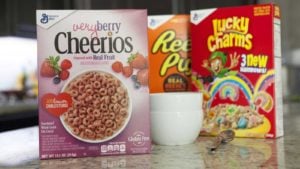Out of 25 packaged food stocks with a market capitalization of more than $2 billion, Beyond Meat (NASDAQ:BYND) has the best performance in 2020, up 123% through Oct. 1
If you broaden the search to include all food-related companies — both consumer cyclical and consumer defensive — Beyond Meat still has the best performance year to date. However, one area that has seen some impressive performances in 2020 despite the novel coronavirus is restaurant stocks.
Matt Maley, the chief market strategist at Miller Tabak, recently discussed several restaurant stocks that are on quite a roll at the moment and could become growth stocks.
“There’s some real reasons to be skeptical about this group, especially because we’re moving into the winter months,” Maley told CNBC on Sept. 18.
“I’m a little concerned. Having said that, there are two stocks that look pretty good, and if they rally much further, they’re going to get some momentum behind them.”
The two stocks he was talking about: Darden Restaurants (NYSE:DRI) and Yum Brands (NYSE:YUM). Interestingly, both of these stocks, while up significantly over the past six months, are still down for the year.
- Beyond Meat (NASDAQ:BYND)
- Domino’s Pizza (NYSE:DPZ)
- Chipotle Mexican Grill (NYSE:CMG)
- Starbucks (NASDAQ:SBUX)
- Freshpet (NASDAQ:FRPT)
- McCormick & Company (NYSE:MKC)
- General Mills (NYSE:GIS)
Regrettably, they are not two of my food stocks to buy that will fatten your bank account.
Food Stocks to Buy: Beyond Meat (BYND)

First up on this list of food stocks is Beyond Meat. I have yet to try Beyond Meat’s meatballs, but if they’re anything like its sausages, I’m going to get some as soon as I see them in my local grocery store.
On Sept. 14, the company announced that Beyond Meatballs would be arriving at grocery stores across the U.S. The plant-based meatballs have no genetically modified organisms (GMOs), soy, gluten, or synthetic ingredients. Also, they have 30% less saturated fat and sodium compared to a nationally recognized brand of animal-based Italian-style meatballs.
Beyond Meatballs is the company’s third product launch in 2020. The other two are Beyond Breakfast Sausages and Cookout Classics. They’ll sell at a suggested retail of $6.99 for 12 meatballs. I can’t wait to try them in my wife’s fantastic spaghetti and meatballs.
With more than 26,000 outlets across the U.S., it’s no wonder Beyond Meat is the number one selling brand when it comes to refrigerated plant-based meat.
Baird analyst Ben Kallo believes that the total addressable market for alternative meats will grow considerably over the next few years as companies such as Beyond Meat take market share away from traditional meat producers.
I couldn’t agree more. Competition is only going to make Beyond Meat that much better as a company and shareholders that much wealthier. Of the food stocks on this list, it’s a big long-term buy.
Domino’s Pizza (DPZ)

The pizza company keeps on rolling along. Up 45% year to date, dividends included, it has averaged an annualized total return of 41.7% over the past 10 years.
In March 2017, Slate produced a list of the 50 NYSE/NASDAQ stocks with the best performance since the beginning of the decade. Domino’s cumulative performance over seven years and three months was 2,092%. Only three companies had a better record.
“For years, Domino’s excelled not at high-quality pizza, but in getting low-quality pizza to customers quickly. Most of its ingredients were canned, frozen, or pre-made, making it easy to toss together a sub-par pie. But being quick only carries so much charm,” Slate contributor Chase Purdy stated at the time.
“The company’s pizza gained a reputation for its cardboard-like consistency, and in one taste test was described as being on par with pies served at Chuck E. Cheese.”
The man responsible for the miraculous change was Patrick Doyle, Domino’s chief executive officer from March 2010 until he retired in June 2018.
“Patrick Doyle has led a remarkable transformation of Domino’s Pizza. His impact on the food, the technology, the operations and the international expansion of this brand has been game-changing,” Cheryl Bachelder, former CEO of Popeyes Louisiana Kitchen, said at the time of his retirement.
“Without a doubt, he is one of the best restaurant CEOs of our time.”
Its stock has risen 50% since then. I expect it to continue moving higher despite the fact Doyle has been gone for more than two years.
Chipotle Mexican Grill (CMG)

At the end of June, Bill Ackman’s Pershing Square Capital Management owned 1,161,232 shares of Chipotle worth $1.22 billion. Ackman first bought into the fast-casual Mexican food chain in September 2016, acquiring 2.9 million shares worth approximately $1.1 billion.
Naturally, given the amount of money he’s made on Chipotle stock — he’s sold 1.7 million shares over the past four years, all of it gravy — he can’t speak highly enough of the company and its brand.
“Management’s rapid response has caused the company’s digital sales mix to increase from just under 20% of sales at the end of 2019, to a peak of 70% of sales in April, moderating to nearly 50% of sales in July, as states have reopened,” Ackman stated in August.
These digital sale gains have proved to be resilient, with Chipotle retaining 70% to 80% of digital sales gains while recovering 40% to 50% of in-store sales as of July. The combination of triple-digit digital sales growth and a gradual recovery of in-store sales has enabled Chipotle to return to mid-single-digit, positive same-store-sales growth in July, an exceptional result in the current environment for a brand that did not previously derive a majority of sales from drive-thru or delivery.
Not surprisingly, CMG stock is up 50% year to date. It’s safe to say the days of its food safety issues are well behind it.
Starbucks (SBUX)

Starbucks has wisely required customers across Canada to wear face masks while in its stores. Sadly, in places like Prince Edward Island, where masks are optional, some people choose to ignore the request. It’s as if people are saying, “I don’t care about anyone but myself.”
Thankfully, where I live in Nova Scotia, masks are mandatory inside, so people wear them. But I digress.
In March, right around the time of the market correction, I suggested that if you could buy SBUX stock for less than $50, you absolutely should. It got as low as $50.02. I sure hope some people ignored my advice and bought in the low $50s. Today, it’s 66% higher than its March lows.
Bill Ackman sold his entire SBUX stake in January for a 73% return. He then got back in when it dropped in March. It has since benefited from the accounting scandal that’s plagued Luckin Coffee (OTCMKTS:LKNCY), its Chinese coffee competitor.
“Starbucks is taking longer to recover than our other restaurant companies given that the brand generates 50% of sales from breakfast, a daypart which is geared towards work and school commuting routines,” Ackman stated in Pershing Square’s semi-annual report on Aug. 28.
“We believe that the company’s long-term earnings power, however, is undiminished, and that recent developments have left Starbucks in perhaps its strongest-ever competitive position, underpinned by the company’s leading digital ecosystem both in the U.S. and globally…”
It’s my experience that when the going gets tough, Starbucks gets going. At this point, I’m doubtful that it will see $50 anytime in 2020, perhaps even 2021.
As food stocks go, it’s a definite long-term buy.
Freshpet (FRPT)

One of only two food stocks on this list that make food for pets, Freshpet stock has rallied almost 88% in 2020. As a result, its five-year annualized total return is an astounding 57.9%, more than four times the U.S. markets as a whole.
When my senior cat became so finicky it wouldn’t eat any food, I gave her Freshpet and she gobbled the stuff up. It likely added a good year or two to our cat’s life. It’s that good. If there’s a stock I should have bought based on personal experience, FRPT is it.
In early September, D.A. Davidson upped its 12-month price target by $14 to $130. Based on its current share price, that’s an upside of 21%. It has a “buy” rating on Freshpet stock. Of the 14 analysts covering its stock, 13 rate it “hold” or better.
In August, despite Covid-19, Freshpet reported second-quarter results: a home run with sales up 33.2% and adjusted EBITDA delivering a whopping 833.3% increase. Business is so good it raised its 2020 sales guidance to $320 million, up more than 30% from 2019. Meanwhile, it expects its adjusted EBITDA to jump 57% this year.
It’s not the cheapest of food stocks at almost 14 times sales. Long-term, however, it will seem like a bargain.
McCormick & Company (MKC)

When it comes to stocks, McCormick is one of those companies that fly under the radar of many investors. Performance-wise, it’s having a good year relative to the markets. It’s up 13.6%, almost four times the return of the U.S. markets as a whole. Over the past decade, it’s delivered an annualized total return of 17.5% for shareholders, better than both the markets and its peers.
As a Canadian, I’m especially fond of its Billy Bee honey brand, which it acquired in February 2008 for $75 million. At the time of the acquisition, Billy Bee controlled 60% of the branded honey sales in Canada, with annual revenues of $37 million. I’m confident McCormick has gotten a decent return on its investment.
Despite Covid-19, McCormick has been able to deliver solid results in 2020. In the second quarter, its sales increased by 10% to $1.4 billion, while its operating income rose 24% to $257.4 million for an operating margin of 18.4%, 240 basis points higher than a year earlier.
Analysts aren’t very upbeat about McCormick stock. Of the 13 covering its stock, only three rate it a buy, and the 12-month target price is $170.91, 12.4% less than its current share price.
As long as it has brands like Club House, Billy Bee, Frank’s Red Hot, and French’s, I expect its stock to continue to deliver market-beating returns despite the skepticism from analysts.
General Mills (GIS)

The maker of cereals such as Cocoa Puffs, Cookie Crisp, Golden Grahams, and Trix is betting on millennials being nostalgic for these sugary sensations.
“Our fans crave a taste of nostalgia — and, while these four cereals have always remained popular, we’ve answered their requests and brought back the taste they remember from childhood,” said Jennifer Jorgensen, vice president of marketing for General Mills cereal.
According to research, 39% of millennials don’t like cereal because it requires a bowl. I can remember as a kid going to Florida and my parents giving my siblings and me cereal in those small boxes you could eat from. Perhaps General Mills should emphasize the box rather than changing the formula.
The company reported its first-quarter results Sept. 23. On the top line, it delivered sales of $4.36 billion, $150 million higher than the consensus estimate. On the bottom line, it had adjusted earnings per share of $1, 13 cents better than analyst expectations. Compared to last year, General Mills’ revenue and sales increased by 9% and 27%, respectively.
As a result, it increased its quarterly dividend by 4.1% to 51 cents. Its annualized payment of $2.04 yields a healthy 3.4%.
Although the company’s North America Retail business accounts for 62% of sales and 75% of its operating profit, I expect General Mills to make further acquisitions in its pet food operating segment in the future.
By doing so, General Mills should become a more balanced business, not so reliant on its cereal business.
Long-term, I like its chances.
On the date of publication, Will Ashworth did not have (either directly or indirectly) any positions in the securities mentioned in this article.
Will Ashworth has written about investments full-time since 2008. Publications where he’s appeared include InvestorPlace, The Motley Fool Canada, Investopedia, Kiplinger, and several others in both the U.S. and Canada. He particularly enjoys creating model portfolios that stand the test of time. He lives in Halifax, Nova Scotia. At the time of this writing Will Ashworth did not hold a position in any of the aforementioned securities.
